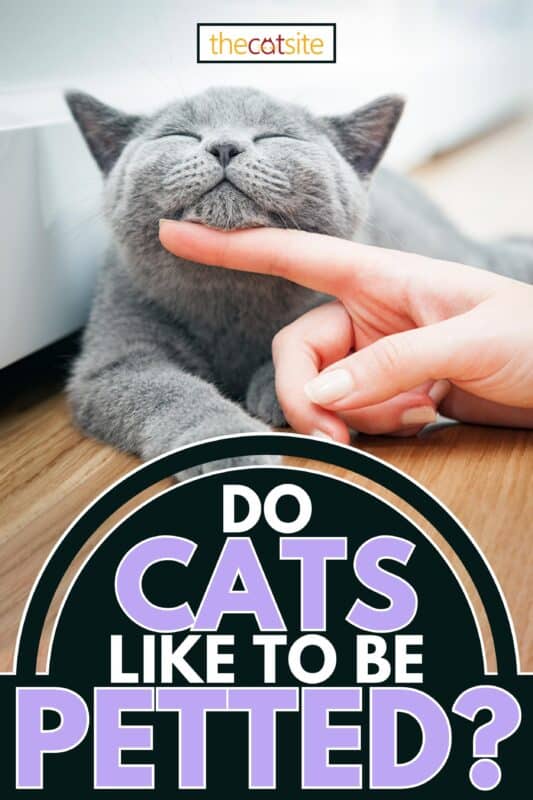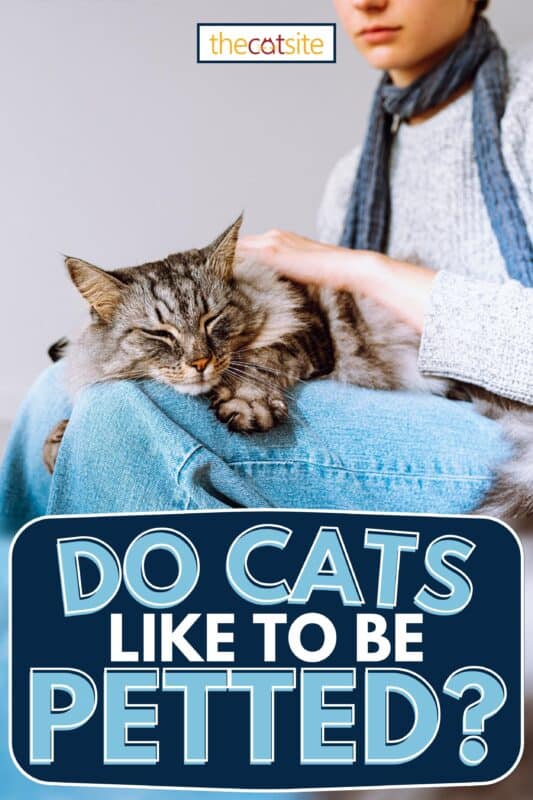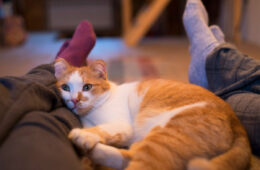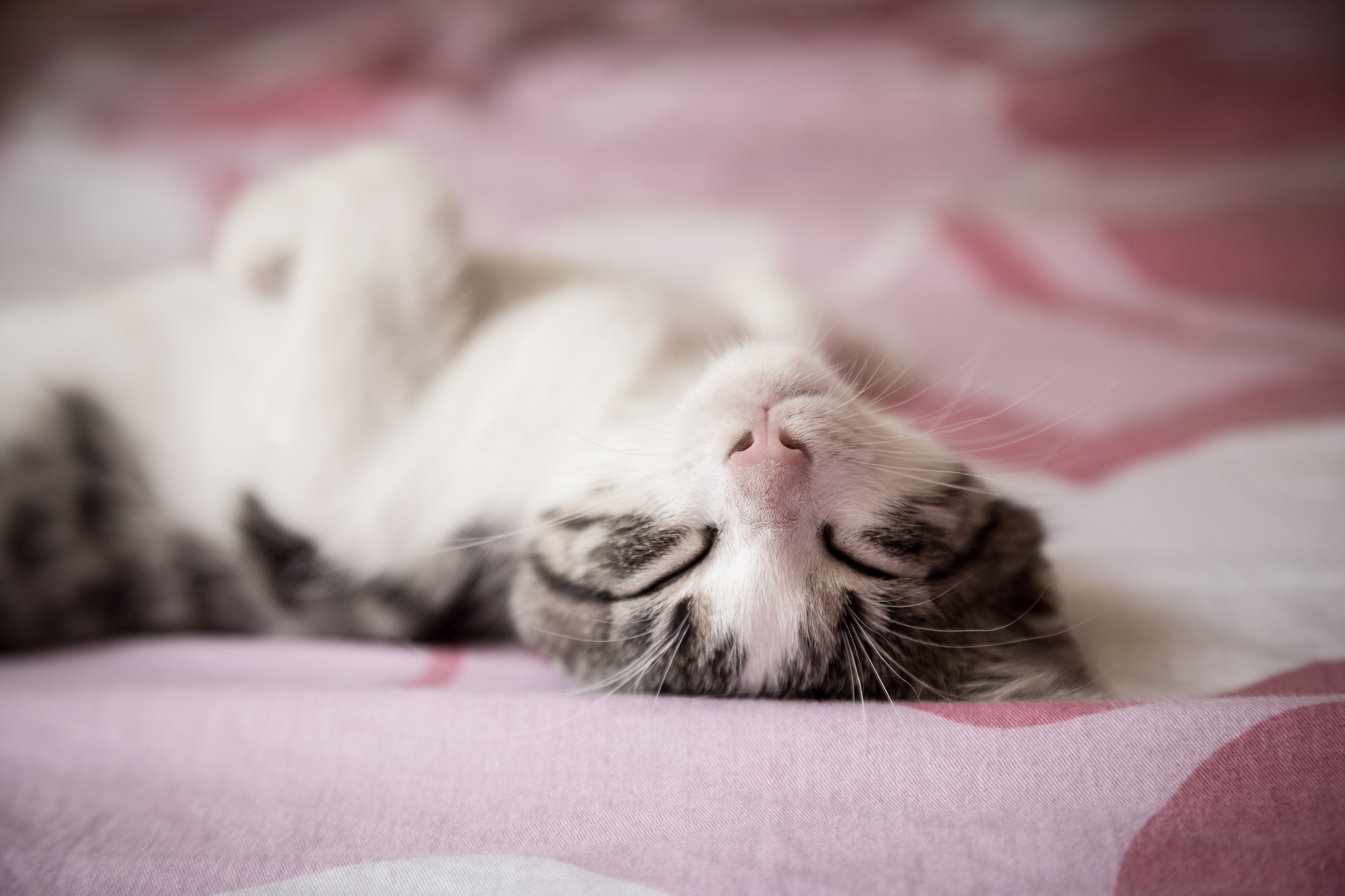Ever wondered if cats truly enjoy being petted? The answer might surprise you. In this article, we will learn about feline affection to explore whether cats like to be petted and why. We'll uncover the factors that influence their preferences, reveal surprising areas cats love to be petted, and discuss the benefits of petting for both humans and cats.
Let's get started learning about cat affection as we navigate through expert advice and real-life experiences to understand what makes our feline friends purr with delight.
Do Cats Enjoy Being Petted?
Cats do so much for themselves without human intervention that a curious first-time cat owner may wonder if it’s okay to pet their cat. After all, cats have sharp teeth and claws, and they certainly know how to use them.
If you're an experienced cat owner, currently scratching your kitty's chin, the idea may seem strange to you. Consider this though would a feral cat enjoy being petted? Probably not.
Try to pet a feral cat against his or her wishes and that cat could soon remind you just how sharp feline claws and teeth are!
With that in mind, whether cats like being petted depends on the following factors:
- The cat’s personality or temperament
- Their level of trust, and
- Whether they’re being approached by a stranger or a familiar and loved caretaker
Does It Really Matter Who's Petting The Cat?
Yes, it does. In fact, we here at TheCatSite did our own internal study about this very topic. We asked 411 cat owners about the reactions their own cats had when being petted and how enjoyable this experience was overall.
Below, you can see a breakdown of the respondent’s answers in a handy graph.
As the graph shows, the overwhelming majority of cat owners, or 52.6 percent, said their cats like being petted by just about any friendly human hand. Now, this doesn’t necessarily mean strangers, but rather members of the family the cat knows and trusts.
However, almost half of the respondents, or 44.1 percent, said their cats only enjoyed being petted by their owners.
Only the smallest portion, or 3.2 percent, had a cat that didn’t like being petted at all.
While this is just a small sampling of cat owners, the enthusiastic and positive answers from the respondents prove that cats generally do like their pets and cuddles, even more so if these are offered by a loving owner.
Why Do Cats Like Being Petted?
Cats may have been domesticated for centuries, but these animals still possess their most basic instincts. These instincts can be a driver of a cat’s behavior even today.
In fact, it is an evolutionary trait that explains why cats so enjoy being petted by their favorite human.
A study by biologist Sophia Vrontou (published in the science journal Nature) suggests that being petted reminds cats of being groomed and licked by their mother.
Vrontou and her team discovered that there are sensory neurons in mice beneath their fur that became triggered when the animals were stroked. For the purpose of this study, petting was tested in the form of stroking.
In fact, the researchers specifically said that light pinching failed to produce similar effects. It’s possible that cats could have the same sensory neurons, which would explain why they’re so eager to be petted.
Another great reason cats like being petted is simply because it feels nice. Stroking a cat feels nice to us and we can tell by a cat's purring and body language that they enjoy it too.
Petting also helps further the bond between human and cat, which members of TheCatSite agree is one of the most rewarding relationships one could have in life.
Where Do Cats Like To Be Petted?
Remember before how we talked about sharp kitty claws and teeth? If you don’t want to feel them, then you should know that some parts of your cat are off-limits when it comes to petting.
These areas vary from cat to cat. Some kitties might like having their hind legs gently touched while other cats will absolutely not go for it. By knowing which areas you can touch, you can avoid irritating Kitty and reduce the risk of being scratched or bitten.
This is one of the keys to preventing feline aggression toward humans.
Generally speaking, cats prefer being petted anywhere they have multiple scent glands. These scent glands are the same ones your cat uses to spread pheromones whenever they rub on anything, you included!
Your feline friend is essentially marking you as their own when they engage in this behavior (which is pretty often). This increases kitty happiness, which would explain why many cats like being petted in the following areas:
- The base of the tail
- Cheeks
- The ears as well as between their ears
- Chin
Of course, depending on your cat, they may not enjoy being petted in every single one of the above areas, which is okay.
You might also find that your cat lets you touch and pet other areas that are more uncommon, such as their tail, the back of their neck, their hind legs, and even the tops of their front paws. Some cats are actually happy to have their belly rubbed!
This absolutely depends on the cat, his or her personality, and how comfortable that cat feels with you. If you’re nervous about making your cat upset, then stick to the four areas listed above. You almost can’t go wrong.
How Petting A Cat Benefits Humans
Having a cat in your life that you can pet and snuggle with can be very beneficial for us humans. In fact, a good petting session will produce more serotonin in your body, which in turn will make you feel happy.
Your cat will be happy, too, so it’s a win-win for both of you! Not only that but your anxiety and stress may decrease.
Anything that gets your kitty purring is also good for both you and them. How? Research published in 1997 found that if your cat purrs at 18 Hertz and louder (up to 35 Hz), you may have improved joint mobility as well as healthier bones and muscles.
Since most cats tend to purr at 20 Hz all the way up to 140 Hz, you should always be able to reap those health benefits whenever you give your kitty a good petting.
But wait, there’s more! You may have a 30 percent decreased chance of having a stroke and heart disease with a cat in your life.
This again goes back to how cats can give you an endorphin boost that gives stress to the boot. That means a healthier heart. If you needed another reason to go pet your cat, you now have a whole host of them.
When To Stop Petting A Cat
Even if you hit all the right "notes," so to speak, your cat might not always be in the mood to be petted. This is their right, and you should respect it.
If your cat walks away from your petting session, then let them do so. Chasing them and further petting them could lead to biting and scratching.
This is due to what’s called overstimulation, or excess petting. Overstimulation can turn even the most docile cats temporarily mean.
When your cat is being petted, they will exhibit signs of enjoying it. When you pet a cat near its tail, he or she will start to wiggle and may even drop down on the floor.
Face pets will elicit hand rubs as well as whisker rotation. Your cat will purr especially hard if they’re in the mood to get a nice chin scratching.
Once your cat no longer purrs or rubs up against you while being petted, you should stop what you’re doing. There are also signs of overstimulation to be on the lookout for, and these also tell you when to stop.
Your cat may tense up, have rippled fur, or stare directly at you. Their ears might slightly flatten, and their tail might move rapidly. Give your cat space if they're overstimulated and try petting them later.
SIGN UP FOR THECATSITE'S EMAIL UPDATES >
Cat-Petting FAQs
Have more questions about petting cats? We tried to cover them all in this section. If you have more, leave a comment or post your question in the cat behavior forum.
How To Pet A Kitten?
Not all cats like human contact, but if you have a kitten, you can warm them up to regular pettings. This doesn’t always work, but it’s certainly worth trying. If you give Kitty treats after petting, the kitten will likely begin to look forward to being petted more often.
This is a behavior that should carry over into adulthood, meaning you’ll have many years of cat petting to look forward to.
With a new kitten, you’ll have no way of knowing which areas they like being petted and which to avoid. Many kittens prefer not to have their ears or their claws and paws petted.
You can gradually teach your kitten to enjoy the former by slowly and softly touching the ears. Make sure you provide treats after doing so.
This shows your cat that nothing bad will happen while being petted in this area; in fact, since they get treats, it’s just the opposite.
Do be aware that overstimulation can occur in kittens, too, who are often curious, rambunctious, and excitable. You will have to be especially careful not to get them too riled up during a petting session to avoid being nibbled on or scratched.
Do Cats Like Being Petted While Sleeping?
The jury is definitely still out on whether you can or should pet a cat while they’re in dreamland. On the one hand, think about how you feel when someone wakes you out of a sound sleep. You’re probably grumpy and angry, right?
Some cats will react similarly. They may try to bite or claw at the source of the petting, i.e. your hand.
Other pet owners have found that there are only certain areas on their cat they can pet while the cat is sleeping. These may include the hind legs, the pads of the paws, and the all-elusive stomach (more on this shortly).
By petting your cat when they’re asleep in these areas, you do risk accidentally waking them up and again possibly getting bitten or scratched.
Cats do a lot more sleeping than we people do. They’ll be asleep for most of their lives (two-thirds). They can experience REM sleep, which is deeper, and non-REM sleep.
Only you can decide whether it’s worth it to bother your sleeping cat for petting. If you find that you must, try to pet the cat when it’s in non-REM sleep, or at least don't wake them up when it looks like they're dreaming.
They’ll be more likely to wake up anyway. Also, remember, if your cat is truly tired, just let them sleep. They’ll be awake at some point and you can pet them then.
Do Cats Like Having Their Ears Scratched?
Above, we discussed whether it’s okay to pet a kitten’s ears. As mentioned, some kittens grow up enjoying having their ears softly scratched and rubbed while others do not like it.
While you can train a kitten to get used to ear rubs, this is not as easy to do with a fully-grown cat. If they’re touch-averse in their ears, you might just have to accept that.
Why Do Cats Like To Be Scratched Under Their Chin?
A cat’s chin is one of the prime spots that contain scent glands full of kitty pheromones. Cats love few things more than spreading those pheromones through rubbing, which we talked about earlier.
They also quite enjoy marking their territory with their pheromones, which is why they’ll rub on you and let you pet their scent gland-heavy areas. Although we humans can’t smell these pheromones, cats can, and that’s good enough for them.
Here’s another surprising reason to give your cat some chin rubs. Cats can develop acne. Some people call it "catne", but whichever name you prefer, it tends to affect a cat’s chin. Cats can get acne regardless of gender or age.
Sometimes a cat’s fur hides their acne so we don’t see it, but the cat definitely feels it. This can be itchy, which is another reason a cat may seek out those beloved chin rubs.
Even without any present acne, it never hurts to get the circulation going in that area with a light massage.
Do Cats Like Belly Rubs?
Have you ever been in this scenario? You start rubbing and petting your cat, and they seem to love it. They drop to the floor and start rolling around, showing their belly. It’s so fluffy and furry, so you decide to pet it. For your troubles, you get scratched or bitten. Why? What did you do wrong?
While there are certainly exceptions, many veterinarians and cat behavioral specialists recommend you do not attempt to rub a cat’s belly.
It makes sense when you consider how vulnerable that area is to injury. In a fight, a cat needs to avoid any contact with his or her belly area, at all costs. It only makes sense some of that caution carries over to petting sessions too.
This photo of Link was shared by our member Kieka in a discussion about belly rubs. Kieka chose the title "Pet the belly at your peril". She owns three cats though and apparently, each one reacts differently to belly rubs:
Link will full on attack if you try to pet his belly(photo). Rocket dislikes the belly petting but it's more of a squiggle away thing. Nightfury loves belly rubs and as much as possible.
While you can certainly try some behavior modification through treats, you should otherwise leave your cat’s cute belly alone, as hard as that can be.
Why Does My Cat Like Me To Pet Her While She's Eating?
That is a surprisingly frequent question in our cat forums. Some cats seem to prefer having their owner around while they eat. No one knows for sure why. And every now and again, there's a cat who actually likes to be petted while eating.
Not all cats like it though. If your cat hasn't developed that particular habit, don't try to pet him or her during mealtime. Chances are they won't like it and even if they do, why start a habit that's going to be a nuisance to keep?
What If My Cat Doesn't Like To Be Petted?
Remember the survey we had? A small—but significant—percentage of cats prefer not to be petted. They may not necessarily be feral cats. Some domestic pet cats—born and bred in a home with people—may be averse to the sensation of being petted.
These cats are often shy cats who prefer to keep some amount of distance between themselves and their favorite humans.
And they do like their humans. Just because a cat prefers not to be petted doesn't mean he doesn't enjoy interaction with the beloved owner - you. Let the cat establish the level of contact he or she prefers.
Be respectful of Kitty's boundaries, and over time they may shift a little and allow you a closer physical connection. Read more tips for living with a shy or timid cat here.
My Cat Suddenly Doesn't Want To Be Petted
Has your cat used to enjoy petting but suddenly doesn't? Does she recoil when you try to pet them now, maybe even hissing at you or biting when you try to touch her? Your cat may be in pain.
Any change of behavior can indicate a health problem. In fact, a change in a cat's behavior is one of the many signs of pain in cats. Your cat may be reacting to a general sense of illness-induced discomfort, or she may be experiencing pain in a specific spot where you were trying to pet her.
If your cat suddenly tries to avoid petting or reacts to petting in an aggressive way, it's time to call your veterinarian.
SIGN UP FOR THECATSITE'S EMAIL UPDATES >
Over To You
How about your cats? Does your cat like being petted or not? Which are his or her favorite areas to be petted? Share in a comment below!
Related readings:
- Your Cat Probably Hates It When You...
- 23 Signs That Your Cat Loves You
- How To Deal With Cat "love Bites"?
- Why Do Cats Knead?


Note: We may get commissions for purchases made through links on this page.




27 comments on “Do Cats Like To Be Petted? Science Behind Feline Preferences”